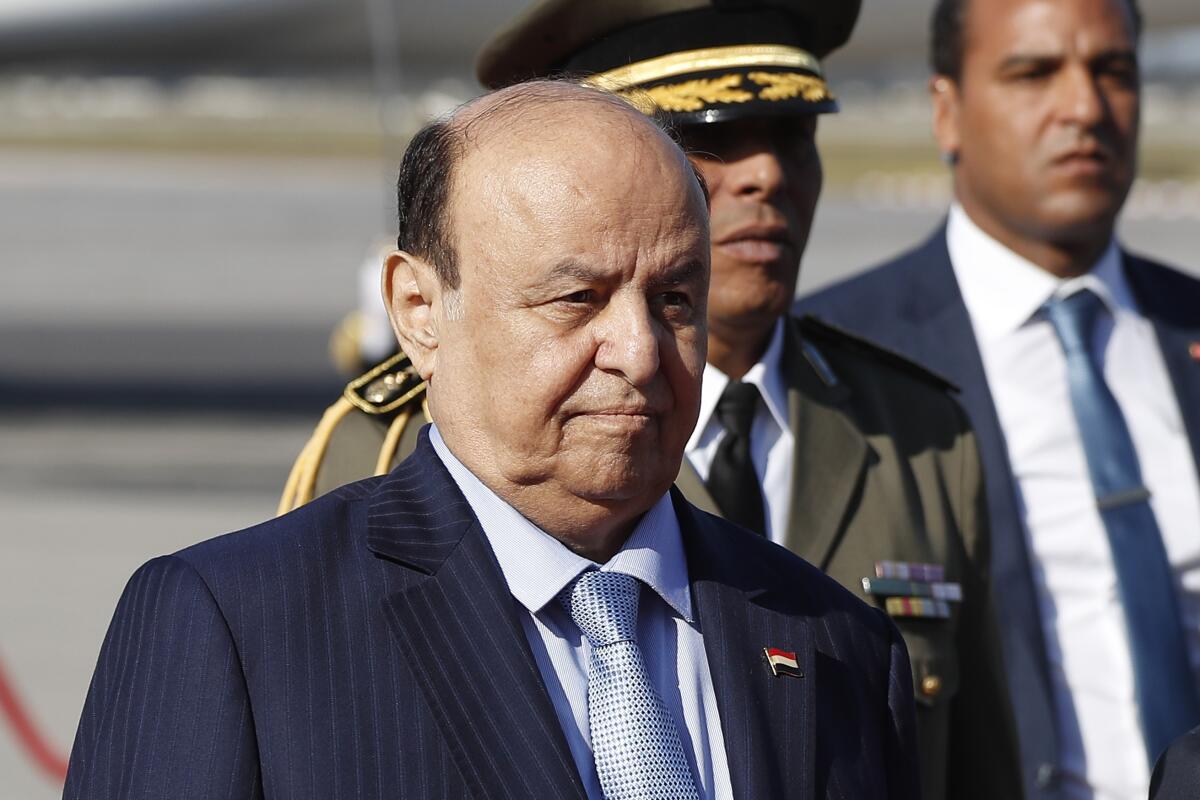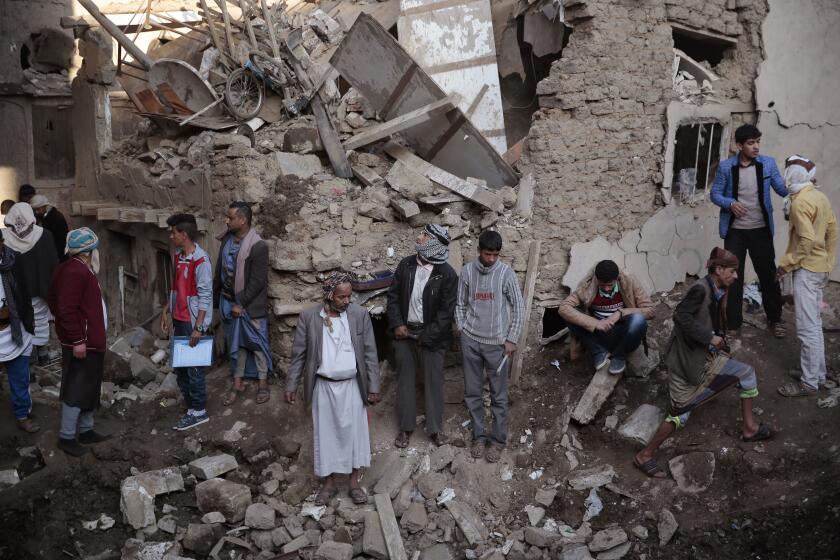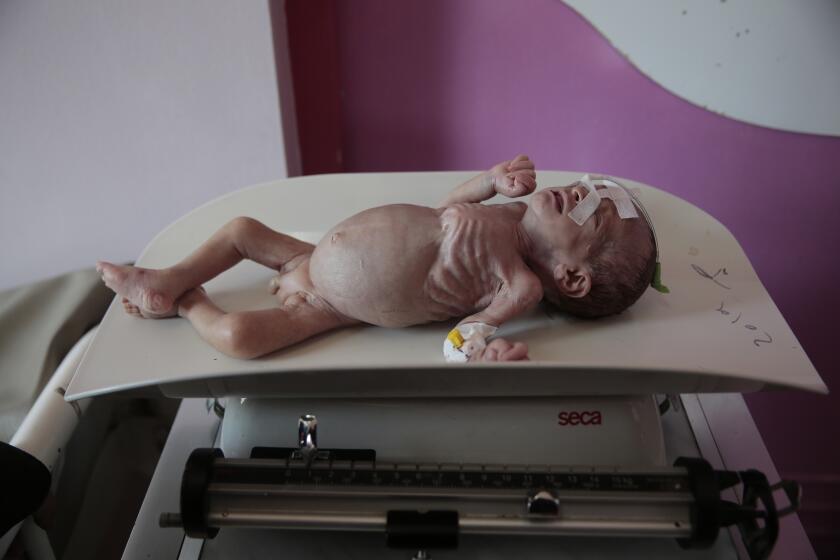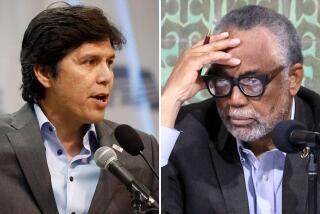Yemen’s president steps aside amid efforts to end its long-running civil war

- Share via
SANA, Yemen — Yemen’s exiled president stepped aside and transferred his powers to a presidential council Thursday, as international efforts to end the country’s long-running civil war gained momentum with a two-month truce.
Saudi Arabia and the United Arab Emirates, major players in the conflict, appear to have played a role in President Abdu Rabu Mansour Hadi’s decision, quickly welcoming it with a pledge of $3 billion in aid. The head of the new ruling presidential council has close ties to Riyadh.
Whether the switch will expedite an end to Yemen’s grinding war remains to be seen, as United Nations-sponsored negotiations have been at an impasse and fighting, airstrikes and missile attacks continued until late last month.
In a tweet, Mohammed Abdul-Salam, the top negotiator for the Iranian-backed Houthi rebels fighting Yemen’s internationally recognized government, dismissed the appointment of the council. The rebels have in the past benefited from squabbles among their rivals.
“Our Yemeni people are not concerned with any illegitimate decisions made by illegitimate parties beyond their boundaries,” he tweeted.
Peter Salisbury, a Yemen expert at the International Crisis Group, described the power transfer as “a big deal.” The development, he tweeted, is the “most consequential shift in the inner workings of the anti-Houthi bloc since war began.”
Red Cross official urges continued aid for Yemen as global attention focuses on Ukraine.
Hadi, 76, said the newly established council would run the government and lead negotiations with the Houthis, according to a statement aired on state-run media.
The move is meant to unify the anti-Houthi camp after years of infighting and disputes, and was almost certainly orchestrated in Riyadh, where Yemeni factions were meeting over the last week to discuss efforts to end the war.
“With this declaration, a Presidential Leadership Council shall be established to complete the implementation of the tasks of the transitional period. I irreversibly delegate to the Presidential Leadership Council my full powers,” Hadi declared on Yemen’s state-run TV.
Hadi also sacked Vice President Ali Mohsen Ahmar, a powerful military figure, and delegated Ahmar’s powers to the council.
Weakened by war, Yemen’s government is barely functioning, but that has allowed creative local leaders to thrive — and perhaps show the way forward.
The council is chaired by Rashad Alimi, an advisor to Hadi and former interior minister in the government of late strongman President Ali Abdullah Saleh.
Alimi enjoys close ties with Saudi Arabia and other political groups inside Yemen, including the powerful Islah party — the transnational Muslim Brotherhood’s branch in Yemen.
The council has seven other members, all of whom have political and military influence in Yemen. That includes Aidarous Zubaidi, head of the secessionist Southern Transitional Council, an umbrella group of heavily armed and well-financed militias propped up by the United Arab Emirates since 2015.
Sheikh Sultan Aradah, the powerful governor of energy-rich Marib province, was also named a member of the council. So was Tariq Saleh, a militia leader and nephew of the late president, who has close ties with the UAE.
Start your day right
Sign up for Essential California for the L.A. Times biggest news, features and recommendations in your inbox six days a week.
You may occasionally receive promotional content from the Los Angeles Times.
Hadi was named president of Yemen in 2012 with a mission to oversee a democratic transition after the Arab Spring uprising that ended Saleh’s longtime rule.
However, the Houthis, a religious movement-turned-rebel militia, allied with Saleh and seized the capital, Sana, in 2014, forcing Hadi and his government into exile in Saudi Arabia.
Months later, Saudi Arabia formed a military coalition and entered the war to try to restore Hadi’s government to power.
The conflict has in recent years become a regional proxy war that has killed more than 150,000 people, including at least 14,500 civilians. It has also created one of the worst humanitarian crises in the world.
More than a dozen U.N. agencies and international aid groups say that 161,000 people in war-torn Yemen are likely to experience famine over the second half of 2022.
Welcoming Hadi’s move, Saudi Arabia urged the presidential council to embark on U.N.-led negotiations with the Houthis to find a “political, final and comprehensive” settlement to the conflict, according to the state-run Saudi Press Agency.
Crown Prince Mohammed bin Salman, the de facto ruler of Saudi Arabia, has also met with the council head and its members, according to Saudi state-run TV.
The warring sides announced a two-month cease-fire this month, the first nationwide truce in Yemen in six years.
Hadi’s announcement came as Yemeni talks called by the Saudi-based Gulf Cooperation Council entered their final day Thursday. The Houthis boycotted the efforts because they’re taking place in Saudi Arabia.
Jordan and Egypt welcomed Yemen’s new presidential council. Arab League Secretary-General Ahmed Aboul Gheit expressed his support in a statement, saying he hoped it would lead the country toward peace.
He also called on all Yemeni parties to respect the truce as a gateway to “serious negotiations that could eventually end the suffering of the Yemeni people.”
France also hailed the appointment of the council as an “important step toward restoring a state that serves all Yemenis.”
More to Read
Sign up for Essential California
The most important California stories and recommendations in your inbox every morning.
You may occasionally receive promotional content from the Los Angeles Times.















